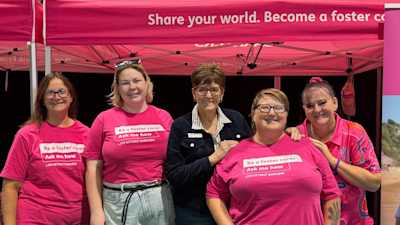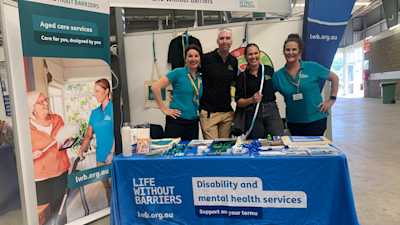Did you know that a huge part of disability support involves social activities? Find out why as we chat with Life Without Barriers’ Lifestyle Support Coordinator, April Carr.

As a vast organisation made up of over 7000 staff across Australia, every person at Life Without Barriers plays an important role in how we provide services. In our new series, ‘Five Minutes With’, we showcase the diversity and breadth of people that make us, well, us! In this instalment, we chatted with April Carr – a passionate Lifestyle Support Coordinator in Life Without Barriers’ disability support team in Adelaide.
Name: April Carr
Role: Disability Lifestyle Support Coordinator
LWB location: Unley, SA
How do you describe your role at Life Without Barriers?
My role at Life Without Barriers is a Lifestyle Support Coordinator. What this means is that I work with people in the Adelaide area who receive our disability services and live independently - like in their own home or with their family, while getting respite support from Life Without Barriers. My job is to help run programs that support these people with community access or social activities. This includes the kinds of everyday things we all do out and about in the community, like shopping, medical appointments, visiting friends or family, work, or trying new activities like an art class.
With so many Lifestyle Supports to choose from, how do work out the best way to support a person?
A person’s Lifestyle Supports is all worked out based on their National Disability Insurance Scheme (NDIS) Plan, as it explains what their goals are and what funding they have to achieve those goals. Our job is to go through a person’s NDIS Plan and provide Lifestyle Supports that are specifically tailored to their needs and the goals, so we’re delivering what they’ve asked for. Some people may just want support doing standard day-to-day tasks like doing the groceries and getting to work, while others will specify that they’re passionate about, say dance, and want to take up special classes.
What is it about your role that gets you out of bed every morning?
For me, everything is about the people I support. From rostering to planning new activities – it’s all about what decisions I can make that will create a better outcome and benefit them. I get an enormous sense of achievement when we’ve been working with someone for a while to achieve their NDIS goals and you start to see their progress, it’s huge. It’s really rewarding on both sides to see goals becoming a reality, especially knowing that the services we provide play a part in that. I also get really motivated when the team and I can use our creativity and imagination to support someone to achieve something outside of their comfort zone. Often this involves socialising, which many of the people we support find daunting. We recently had a lovely older woman who was interested in pottery, but she also felt a bit self-conscious about her vision impairment so rarely socialised. That’s when the team and I introduced her to pottery classes, so she was getting to learn new skills as well as meeting new people, which can be empowering for anyone. She found it a bit confronting at first but now she loves the classes.
What’s been your favourite memory since working here?
Well I’ve been with Life Without Barriers for five years now, so there’s been many special memories, but one experience in particular really highlighted our strength in responsiveness. There was a young gentleman with an intellectual disability who didn’t have much in the way of informal support, like family and friends. He’d actually been in foster care and came to Life Without Barriers for support once he turned 18. I believe it was Christmas Eve. We began supporting him for a few hours a week, but it became apparent just how vulnerable he was - he was facing eviction among other struggles, he was really at breaking point. The team and I rallied around and got him into emergency accommodation as quickly as possible. Within three months he’s now in stable accommodation, living independently, we’ve had his NDIS Plan reassessed to ensure he’s getting the regular support that he really needs, and he’s now looking at employment opportunities! It’s a huge turnaround in a short period of time. That’s where Life Without Barriers’ value of responsiveness really shines. While we do support many people who are coming from extremely challenging situations, it is so important and so powerful that we can quickly respond and pivot our support to get them to a better place in a really profound way.
Is there something you’re working on at the moment that really excites you?
The main thing I’m trying to get off the ground at the moment is introducing group activities like dancing or cooking classes, which our other people we support can join, not just Lifestyle Supports. Seeing just how much they loved interacting and dancing together at our Christmas party in December, it’d be fantastic to offer a regular opportunity for them to spend time together, socialising with people with similar interests. I’ve been linking up with our teams in Tasmania who are already delivering this option really well, so I’m in the process of understanding how we can too and ensure it’s all covered by NDIS funding. Watch this space…
What’s a secret skill of yours that your colleagues don’t know about?
I’m a bit of an open book, so my poor colleagues know most things about me. I did do ballet for 19 years and received certificates under the Royal Academy of Dance. More recently though, I have taken up dance again, just a little older and slower now.


